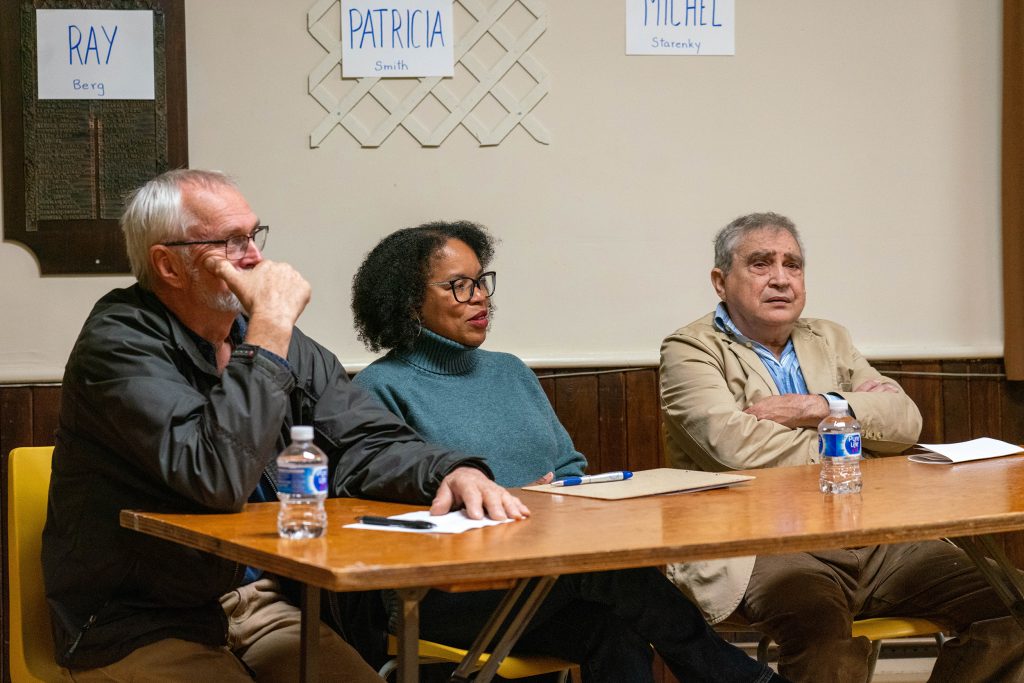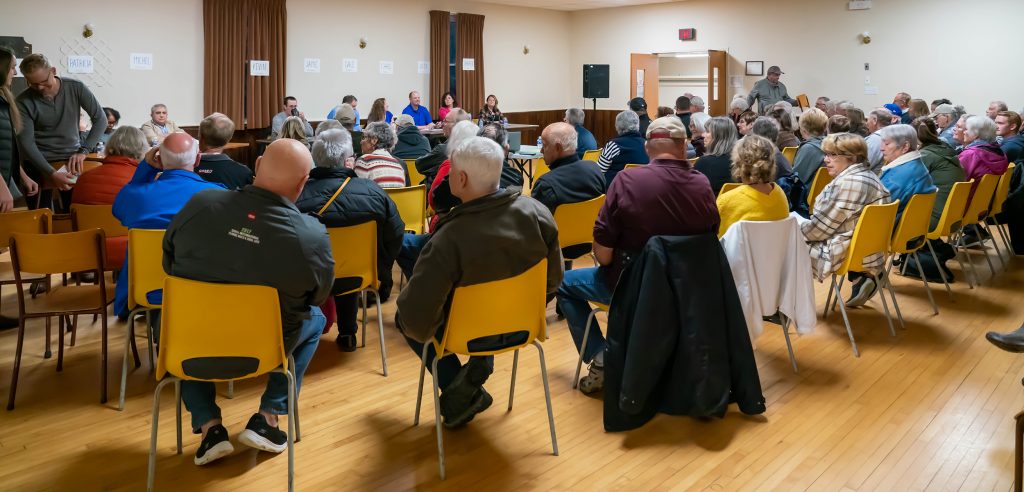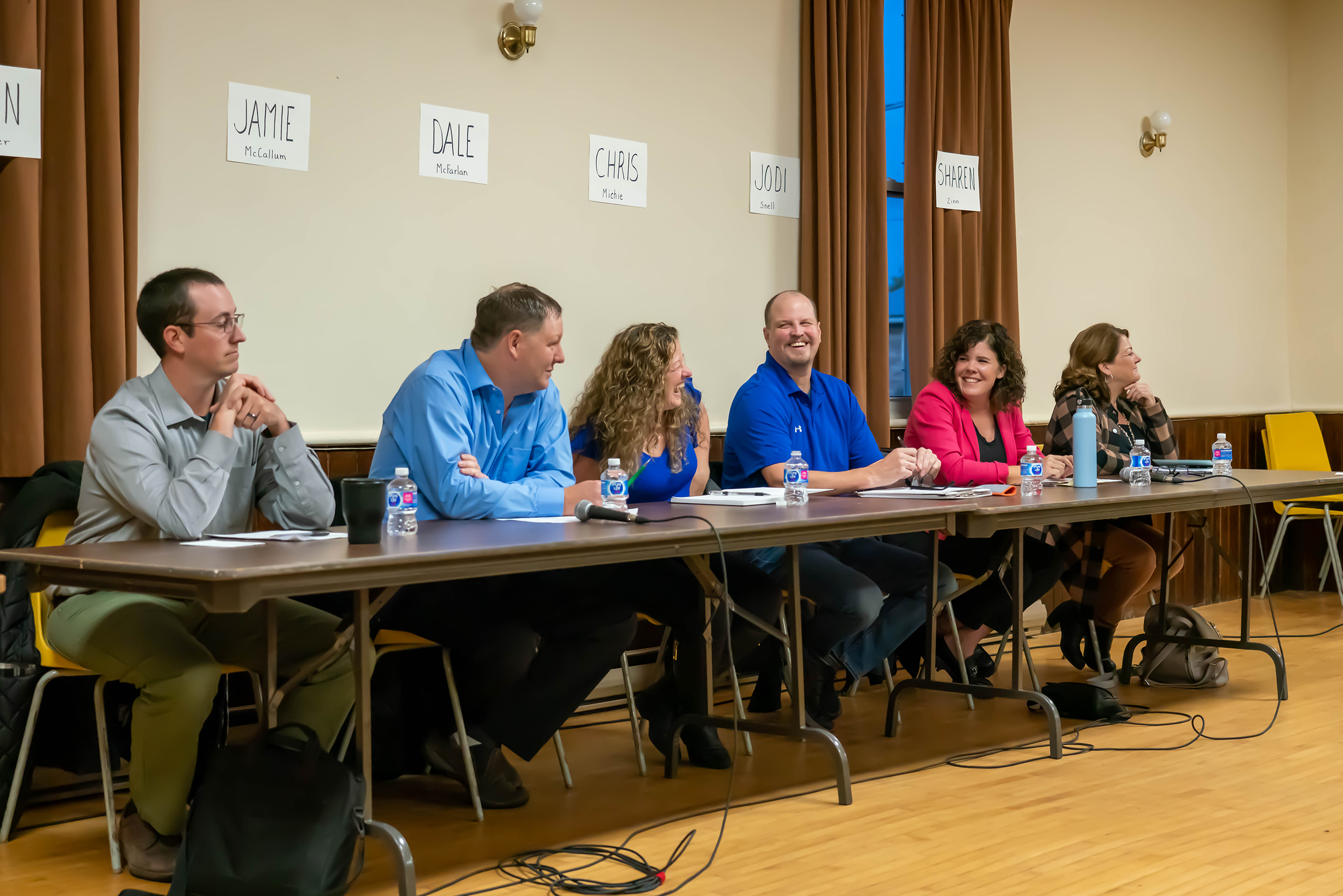BLUEVALE – The Bluevale Community Hall filled to capacity for the Morris-Turnberry all-candidates meeting on Oct. 13 despite the short notice.
Christine Marshall of the Wingham Community Connectors, who hosted and moderated the meeting, welcomed residents of Morris-Turnberry to the hall, thanking them for the wonderful and surprising turnout.
“This is phenomenal,” Marshall said. “Last week, Friday afternoon, four concerned citizens in this municipality sat down around a farmer’s table and decided that we needed to hear from our candidates. We were so disappointed that nothing else had been done.”
Word of mouth is a powerful tool in small communities, and Marshall thanked everyone who stepped up to help get the word out.
“And obviously, it worked,” she said. “This crowd is just a testament to you as voters who want to know who you’re voting for, instead of just a name on a piece of paper. So, thank you, thank you so much for coming in.”
The candidates lined the front of the auditorium, sitting under their names pinned to the wall behind them, in alphabetical order; the same way they will appear on the ballot, to create a visual for voters to remember the faces while they vote.
Mayor Jamie Heffer has been acclaimed. The rest of the candidates were in attendance: Kevin Freiburger, Jamie McCallum, Dale McFarlan, Chris Michie, Jodi Snell, and Sharen Zinn introduced themselves and answered questions from the audience, which were collected from individuals seated in the gallery.
This all-candidates meeting included the Avon-Maitland District School Board (AMDSB) trustee contenders Ray Berg, Patricia Elaine Smith, and Michel Starenky.
Each candidate in both groups was given two minutes for a brief introduction speech where they had the opportunity to provide background information on themselves and what they would bring to the table if elected.

Avon Maitland District School Board trustee candidates, from left, Ray Berg, Patricia Elaine Smith and Michel Starenky ponder a question during the all-candidates meeting in Bluevale on Oct. 13. (Cory Bilyea photo)
AMDSB trustee introductions and Q & A
The questions were geared to each group separately, with the school board trustees going first.
Michel Starenky went first, a decision made by the drawing of cards before the beginning of the meeting.
Starenky told the audience about his history as an educational specialist at Vanier College in Montreal.
“My main function was to integrate teachers and students into the new technologies. Not an easy task as college teachers proved to be an independent lot,” said Starenky.
“From the chalkboard to the smartphone, from the typewriter to the computer, from the projector to the TV screen, to the internet, it was a never-ending task to keep up with the ever-changing innovations in technology.”
He talked about the constant talks, meetings, workshops, and budgets where “persuasion and tact were necessary and occasionally not always successful.”
“We all know that education is a difficult endeavour; it is in the news constantly. Everyone has an opinion, either privately around the kitchen table or publicly at PTA meetings and so forth,” said Starenky. “But I believe that it is with your school trustee and the committee that local education issues can be raised and resolved.
“I also believe it is with your school trustee and the teachers that we can continue to drive toward excellence for all our students. It is with your school trustee at the Ministry of Education that we can maintain the integrity of the educational system.
“I think there will be trying times that have to be resolved in the education of our children. Therefore, we have to prepare our kids not only for our core education, but to provide them with the skills and the confidence they deal with the ever-changing economic world. I believe that I have the qualifications and experience to be an effective trustee during these times.”
Ray Berg kept his introduction speech short, introducing himself as a local, retired butcher shop owner who was in construction for “quite a while.”
“My concerns are with the education system; it seems to be getting a little liberal. I believe children are the responsibility of the parents, not the government. I believe as a trustee, we’re supposed to direct the education system somehow. I don’t know a whole lot about it.
“I believe that there’s values that can be taught, children should be taught the three R’s,” added Berg.
“Teaching children character, like integrity, morality, that kind of thing. Because we want to build a better community, we want to build a better government, a better country.”
Patricia Elaine Smith stood up next, delivering an eloquent introduction as to why she would make a great school board trustee as a mom of two school-aged children who, along with her husband, farm together alongside a “menagerie of animals that my youngest calls her funny farm.”
“I am running for school board trustee because of a passion for children and education, and as a parent, I know the value of having your voice heard. While I am aware that the ultimate decisions for schools come from the province. I strongly believe that having solid representation on the board allows for local voices to become part of the conversation that impacts change.
“I am a PhD candidate in anthropology from McMaster University, both my PhD and master’s research focused on children. I have also taught within the university setting for a decade. I have extensive experience volunteering within the community, but within the schools themselves.”
“Through many years of volunteering, I have learned to listen, to think, and to act. These qualities are essential. It’s on us to represent the community.
“As a school board trustee, I realize I’m only one vote on the board. However, you have my word, that I will represent you and our students and our area in an adequate, equitable and fair manner seeking solutions to questions that arise.”
The trustee candidates were asked three questions.
The first question was about integrating students with violent tendencies or different learning abilities into the same classroom as other students on a full-time basis, and what they would do to ensure their education needs were met.
Berg answered first, saying he is “old fashioned.”
“I would say that they have the right to education,” he said. “But it might be good to spend some time working on a farm. Discipline is good, but how do you put teeth into it?”
Smith said what she believes and what can actually happen are separate things.
“The school boards can only do so much. I believe that we need to assess what is going on through the child; there are different ways that you can incorporate children into schools, despite their different needs. And that the focus, I believe, fundamentally, bottom line is on the child, what is best for them, how you can make it work for the students as a whole as well,” she said.
Starenky said this was “a question that won’t be answered.”
“Why do we have these tough questions? The fact is, is that one could stream kids and still have the same education. But if you stream only the ones with disabilities or other problems, then they will be considered either one, not part of the society, right? But at the same time, you have to consider the ones who have the capability and also the wherewithal. It’s a question that won’t be answered,” he said. “So, I would agree to a streaming situation, bring in the qualified teachers that are available out there and slowly move the kids along. And then, some of them could be integrated. The ones with psychological problems, after a while, they can be integrated. That can be done, but that takes a lot of energy.”
The second question asked candidates how they see their role as a trustee.
Smith answered first, saying the role of a trustee is to listen to the community, teachers and children and “then try to shape the policies that impact our local situation.”
“The trustee can engage with the parents and the community and the children and learn what they see is best to further the children’s education, because in the end, that’s what we want. We want the kids to come out of school with the solid education and the ability to function in the world at large,” she said.
Starenky, visibly upset by the question, said, “You have to throw in the politics. The thing is, is that years ago, the school boards had more power than they ever had. So, what happens, the government pulls everything and they set the standards, right? And how do you fight their standards? We could disagree as much as we want.”
He rambled on about the politics of the job, finishing up by saying, “I’m sorry, I’m joking, because I worked at the college and my god, working with the administrators and the teachers and everybody else, it’s like, I was, one of the reasons I quit was the fact that at a certain point, you’re too tired. But I’m willing, don’t get me wrong, to get involved in this battle for the children.”

A capacity crowd was on hand at the Bluevale Community Hall to hear from council and school board trustee candidates. (Cory Bilyea photo)
Berg sees a trustee as someone who encourages students of all abilities to do the best they can.
“I’ve had several businesses; I’ve apprenticed different kids and I’ve apprenticed kids that were handicapped. They can learn to cut meat, and they can learn to hammer nails, the physical part of it, if they felt good about themselves, and I would, as a trustee encourage that kind of thing,” said Berg. “If we’re doing something different than what governments advocating, so what, long as it works… we can stand up to the government.”
The last question for the trustee candidates was about how they felt about masking in schools.
Starenky made his feelings quite clear.
“I never believed in COVID,” he said. “I didn’t get vaccinated, right, because I don’t believe in it. I did all the statistics, and somehow, we were conned, this is my opinion, right?… The fact is, I don’t believe in the masking. The fact is, is if you believe in yourself, if you believe that all young kids and we have a what do you call that immune system? That should work. Yes, people have died. My brother died of an asthma attack. My father died at 96. What can we do about that? But to mask, it just proves that we don’t care about our kids.”
Berg also stated he is against masking.
“You need to take a stand. I don’t trust the government,” he said.
Smith said she didn’t have an opinion one way or the other.
“I understand why masking is important. I understand why some people choose not to mask. I think we follow the science on this, and if something arises and it’s necessary, then we try to adjust according to what is presented before us,” she said. “I think there are solid arguments why some children should not be masked. And we need to pay attention to that and address the issue on an individual basis to ensure that everyone has their best interests met.”
Q&A session with municipal council candidates
The first question to the candidates was regarding the future of community events like parades. All of the candidates agreed that the pandemic slowed down these types of gatherings over the last couple of years. Financially, the current council had no choice but to choose between public works projects like road grading and these events. However, most noted that they would attend any planned events by volunteer groups, saying they would “get their faces out there in the community.”
Candidates were then asked their thoughts on protecting agricultural land, especially as the province is encouraging development for new housing.
Candidates agreed that Morris-Turnberry did not have a lot of room to expand, and growth would more likely come from private landowners who choose to build additional homes on their property. In those cases, council would not have much say in the matter.
They also agreed that generating more tax money requires more people to move to the area and purchase homes.
The subject of tiny homes came up, and candidates agreed that as long as they fit into the official town plan and zoning bylaws, additional homes and/or tiny homes would not be an issue.
The night’s big question was about the ongoing relationship issues over cross-border agreement negotiations with North Huron. Candidates were asked how they hope to “improve relationships with neighbouring municipalities” regarding shared services.
Sharen Zinn, currently deputy mayor, said she has spent a lot of time over the past four years on this agreement, as have staff and other council members.
“We are so very close to this. And if you want to know what’s happening, it’s all on our website, and go on our website and read about every meeting that we’ve had,” she said. “Shared services are great, but it’s got to work for both sides, it cannot be one-sided.”
Kevin Freiburger, also seeking re-election as councillor, suggested the results of the election on both sides of the border may factor into negotiations.
“Sometimes it’s hard to have rational discussions with some people,” he said. “I know we can do well with shared services; we just recently signed a contract agreement with two other municipalities. And it was a nice, short agreement. There’s ways to do it is just a matter of having good rational discussions and finding something that works for both sides, and having people that are willing to have those discussions and are able to have those discussions.”
Dale McFarlan agreed with both previous speakers.
Jodi Snell suggested leaving the past in the past and “start on finding new solutions, starting new conversations and not taking or going in with a negative approach to this discussion.
“I think it can work out and I think there are solutions, and my biggest thing is as long as the solutions are beneficial to both the ratepayers…that is one of the most important things, it’s the ratepayers here are going to benefit from whatever the final agreement is,” she said.
Jamie McCallum, who is seeking re-election, said it “takes two parties to tango.”
“If the person on the other side doesn’t want anything to do with you or everything you say to them, they shut down, are you going to get anywhere? Honest question,” he said. “I’m favour speaking to them in person instead of through communication. I would like to add that we have worked in agreements with South Bruce, Huron East and Central Huron on different things other than services, and we’ve got great working conditions with all of them. North Huron, I’m all for working with them. I think the first thing the council should do is organize a get together between the two municipalities and get stuff ironed out and say, ‘Hey, let’s refresh the page.’”
Chris Michie said the previous speakers have “said what I was going to say.”
“Like Kevin said, I think we just need fresh eyes on both sides. Start fresh again. And we go to the table, they come to the table and like everybody else said, respect each other, listen to each other and make it fair for both sides,” he said.
The candidates were asked about the current hospital emergency room closures, and all agreed that there was not much they, as a council, could do as the province and the hospital boards run hospitals. However, they did say they could write letters of support for initiatives and try to make the community attractive to entice new doctors and nurses.
The candidates made closing remarks, thanking the people for showing up in such great numbers and asking for support for their campaigns.
Marshall finished the evening by thanking the volunteers, the candidates, and the audience for coming out to the event.
“I did want to thank all those people who put this together so quickly. It makes me feel so much better about going to exercise my right to vote down,” she said.



